How Social Media Fuels Eating Disorders
Introduction
Social media is where we go to laugh at memes, keep up with friends, or get outfit inspo. But behind the filters and hashtags, there's a darker side that’s harder to scroll past—especially when it comes to how we see ourselves.
For many teens, spending hours on Instagram, TikTok, or Snapchat can quietly fuel harmful thoughts about food, weight, and body image. Eating disorders like anorexia, bulimia, and binge-eating aren’t just caused by social media—but the pressure to look “perfect” online can definitely make things worse.
In this post, we’re diving into exactly how social media can feed into eating disorders—and what you can do to protect your mental and physical health.
1. Comparison Culture: Always Feeling “Less Than”
It starts with a scroll. You see influencers with flawless skin, sculpted abs, or “What I Eat in a Day” videos that make you question your lunch. Even if you know it’s edited, your brain still compares.
Apps like Instagram and TikTok are built around visual content, so your feed is often flooded with images of people who fit a certain “ideal” body type. This can lead to:
Constant comparison to unrealistic bodies
Feeling ashamed of your own appearance
Thinking you need to eat less or change how you look to be liked
Over time, this comparison trap can spiral into disordered eating habits or full-blown eating disorders.
“Social media doesn’t cause eating disorders by itself, but it can trigger or worsen them by normalising harmful beauty standards and diet culture.”
2. The Algorithm Loves Extremes
Social media algorithms are designed to keep you watching. That means if you click on or like one post about dieting or weight loss, you’ll likely be shown more—and more—and more.
Before you know it, your “For You” or “Explore” page is filled with:
Extreme calorie counting
Fad diets and detox teas
“Thinspo” and body-check videos
Unqualified influencers promoting unsafe habits
What starts as “health inspiration” can quickly become toxic content that promotes restriction, obsession, and shame.
3. Filters, Editing & Body Dysmorphia
Beauty filters might seem harmless, but they can seriously mess with how we see ourselves. Many people now compare their real faces and bodies to the edited versions they see on screen—even their own.
This can contribute to:
Body dysmorphia (seeing flaws that aren’t really there)
Feeling like you’re never “pretty” or “thin” enough
Turning to food restriction, over-exercising, or purging to "fix" your body
Snapchat dysmorphia and filter fatigue are real—and they’re affecting how a whole generation feels about their appearance.
4. Diet Culture Disguised as Wellness
Not all harmful content looks dangerous. A lot of it hides behind the word “wellness”—think green juices, calorie-burning workouts, and “clean eating.”
But when taken to extremes, wellness trends can lead to:
Obsessing over food ingredients and labels
Cutting out major food groups
Feeling guilty for eating “normal” or fun foods
Justifying restriction as “being healthy”
This disguised diet culture can normalise disordered eating under the illusion of self-care.
5. It’s Not All Bad — But Be Smart With Your Feed
It’s important to say: social media isn’t all harmful. There are also amazing accounts spreading awareness about eating disorders, body positivity, and mental health.
The key is to:
Unfollow accounts that make you feel bad about your body
Follow creators who promote self-acceptance and realistic beauty
Limit screen time if you feel overwhelmed
Remember: a highlight reel is not real life
You can curate your feed to support your health instead of harming it.
Where to Get Help
If you’re struggling with eating or body image issues, here are some resources:
BEAT (UK Eating Disorder Charity) – beateatingdisorders.org.uk
NEDA (USA) – nationaleatingdisorders.org
Mind – mind.org.uk
Talk to a GP, school counsellor, or trusted adult
Final Thought
Your worth isn’t measured by a number on a scale or how your body looks in a selfie. And you deserve to live a life free from constant pressure, shame, or hunger.
If social media is making you feel anxious, unworthy, or obsessed with food and appearance—it’s okay to take a step back and ask for help. You’re not alone, and recovery is always possible.
FAQ’s
-
Not directly, but it can be a major trigger. Eating disorders are complex and can be influenced by genetics, mental health, and environment. Social media often fuels comparison, pressure, and toxic messages that make things worse.
-
Posts promoting extreme weight loss, “thinspo,” calorie counting, edited body transformations, or “clean eating” can all be harmful—especially when they come from unqualified influencers or are presented as health advice.
-
Curate your feed. Unfollow toxic accounts, limit time on apps, and follow people who promote body positivity and realistic health. It’s also okay to take breaks and talk to someone about how you’re feeling.
-
TikTok’s algorithm can be especially aggressive—one click on a diet video can flood your feed with similar content. But all platforms can be risky depending on how you use them. Awareness is key.
-
Look for signs like skipping meals, obsessive calorie tracking, hiding food, constant body-checking, or avoiding social situations with food. Emotional signs include anxiety, low self-worth, and withdrawal from friends or family.







